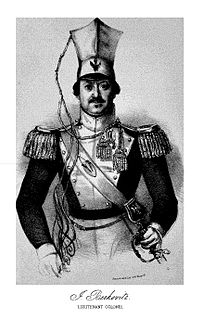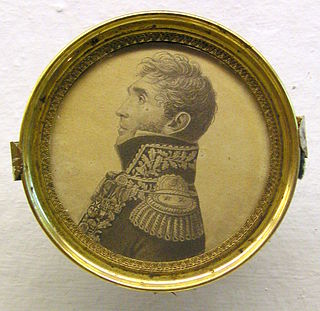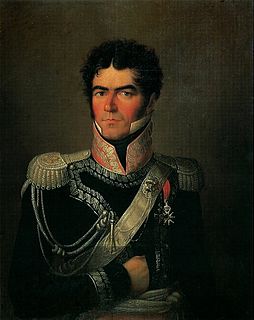 W
WJózef Berkowicz also known as Joseph Berkovitz or Berkowitz was a Polish military officer of Jewish origin, the only son of Berek Joselewicz.
 W
WBaron Dezydery Adam Chłapowski of the Dryja coat of arms was a Polish general, businessman and political activist.
 W
WJózef Grzegorz Chłopicki was a Polish general who was involved in fighting in Europe at the time of Napoleon and later.
 W
WPrince Konstanty Adam Czartoryski was a Polish nobleman. Colonel since 1809 in the Duchy of Warsaw and Brigadier General since 1815 in Congress Poland.
 W
WJan Henryk Dąbrowski was a Polish general and statesman, widely respected after his death for his patriotic attitude, and described as a national hero who spent his whole life restoring the legacy of Poland.
 W
WHenryk Dembiński was a Polish engineer, traveler and general.
 W
WCount Stanisław Dunin-Wąsowicz was a Ukrainian-born Polish general of the November Uprising, Captain of the 1st Polish Lancers, Napoleon's bodyguard and aide-de-camp during his 1812 Russian Campaign.
 W
WStanisław Fiszer (1769–1812) was Polish General and Chief of Staff of the Duchy of Warsaw.
 W
WCyprian Godebski was a Polish poet, novelist and father of writer Franciszek Ksawery. He was an outstanding poet of the so-called "Legions Poetry".
 W
WMichał Grabowski of the Oksza coat of arms was a brigadier general of the Army of Duchy of Warsaw.
 W
WCount Hans Johann Moritz Hauke was a Polish general and professional soldier of German extraction. He was a member of the Hauke-Bosak family.
 W
WWładysław Franciszek Jabłonowski was a Polish general and military commander, who fought for France during the Napoleonic Wars. He is the first known Polish general of African descent.
 W
WBerek Joselewicz was a Polish Jewish colonel of the Polish Army during the Kościuszko Uprising. Joselewicz commanded the first Jewish military formation in modern history excluding Prince Potemkin's Israelovsky. He was also a merchant and financial agent of the Polish magnate Prince Massalski.
 W
WHenryk Ignacy Kamieński was a Polish brigadier general. He fought on the French side in the Napoleonic Wars and then on the Polish side in the November Uprising.
 W
WStanisław Klicki of Prus (1775–1847) was a Polish military commander, aristocrat and a general of the Polish forces. For his service during the Napoleonic Wars, he was made a baron of the French Empire by Napoleon Bonaparte. During the November Uprising he commanded all Polish forces on the left bank of the Vistula River.
 W
WBaron Karol Otto Kniaziewicz was a Polish general and political activist.
 W
WJan Konopka was a lieutenant in the Kościuszko Uprising, captain of the Polish Legions in Italy, regiment commander in the Legion of the Vistula, as well as general of the French Army and the Duchy of Warsaw. Konopka has been described as "a brave man with cold mind in combat."
 W
WJózef Dominik Korwin-Kossakowski, was a Polish–Lithuanian statesman and military commander, a participant of Targowica Confederation and a colonel of the Polish Army. He used the Ślepowron coat of arms.
 W
WBaron Jan Leon Hipolit Kozietulski was a Polish noble, military commander and an officer of the armed forces of the Duchy of Warsaw during the Napoleonic Wars. He is best remembered as the heroic commander of the Polish cavalry charge at the Battle of Somosierra.
 W
WCount Wincenty Krasiński was a Polish nobleman (szlachcic), political activist and military leader.
 W
WCount Jan Stefan Krukowiecki was a Polish general and chairman of the Polish National Government during the November Uprising and general during Napoleonic Wars fighting in the troops of Napoleon.
 W
WTomasz Andrzej Adam Łubieński, comte de Pomian was a brigadier general in the Polish army, senator, landowner in Kalisz and businessman. Hoping to liberate Poland, he fought on the French side in the Napoleonic Wars, fighting at Essling, Wagram, Dresden, Ulm, Leipzig, Hanau and Berezina, for which Napoleon made him a baron de l'Empire. He also later took part in the November Uprising against Russia.
 W
WKazimierz Małachowski of Gryf (1765–1845) was a Polish military officer and a general of both the armed forces of Duchy of Warsaw and the Kingdom of Poland. A recipient of Virtuti Militari for his actions during the Napoleonic Wars, he is best remembered as one of the last Commanders-in-Chief of the failed November Uprising. He assumed command shortly after the disastrous battle of Warsaw.
 W
WFranciszek Młokosiewicz was a Polish officer who served during the Napoleonic Wars and the November Uprising. He served in the Army of the Duchy of Warsaw and participated in the Battle of Fuengirola.
 W
WJózef Niemojewski was a Brigadier General of the Duchy of Warsaw, Major General of the Polish insurrectionist forces in Wielkopolska during the Greater Poland Uprising (1794) and the Kościuszko Uprising, Brigadier General in the Grande Armée of Napoleon Bonaparte and elected starosta of Śrem eldership.
 W
WWladyslaw Tomasz Rawicz-Ostrowski (1790-1869) was a Polish nobleman (szlachcic), Count since 1798.
 W
WLudwik Michał Pac was a Polish general in the Napoleonic army (1808–1814). His parents were Michał Józef Pac and Ludwika Tyzenhaus.
 W
WPrince Józef Antoni Poniatowski was a Polish general, minister of war and army chief, who became a Marshal of the French Empire during the Napoleonic Wars.
 W
WIgnacy Prądzyński was a Polish military commander and a general of the Polish Army. A veteran of the Napoleonic Wars, he was one of the most successful Polish commanders of the November Uprising against Russia.
 W
WPrince Dominik Hieronim Radzivil was a Polish-Lithuanian nobleman.
 W
WPrince Michał Gedeon Hieronim Radziwiłł was a Polish–Lithuanian szlachcic, senator, owner of the Nieborów and others properties.
 W
WMaciej Rybiński, Polish general, last chief of State of November Uprising.
 W
WPrince Eustachy Erazm Sanguszko (1768–1844) was a Polish nobleman, general, military commander, diplomat and politician.
Michał Sokolnicki was a Polish nobleman, general, military engineer, politician, and writer.
 W
WJózef Sowiński (1777–1831) was a Polish artillery general and one of the heroes of Poland's November 1830 Uprising.
 W
WFerdynand Ignacy Stokowski was a Polish officer in the French army of the Napoleonic Wars. He was one of the squadron commanders of the Polish 1st Light Cavalry Regiment of the Imperial Guard and made a baron de l'Empire in 1811, before being dismissed from the French army with the rank of brigadier general.
 W
WPrince Antoni Paweł Sułkowski, of the Sułkowski family, was a Polish division general and later overall commander of the armed forces of the Duchy of Warsaw.
 W
WMichał Tyszkiewicz was a member of the noble Tyszkiewicz family and polkovnik in the French Grande Armée during Napoleon's invasion of Russia in 1812. He acquired several manors in present-day Lithuania, including those in Palanga and Biržai. He and his descendants built and reconstructed several manor houses that are some of the most important sites of manorialism heritage in Lithuania.
 W
WJan Nepomucen Umiński of Cholewa (1778-1851) was a Polish military officer and a brigadier general of the Army of the Duchy of Warsaw. A veteran of the Kościuszko Uprising, Napoleonic Wars and the November Uprising, he died in exile in Wiesbaden.
 W
WPrince Józef Zajączek was a Polish general and politician.